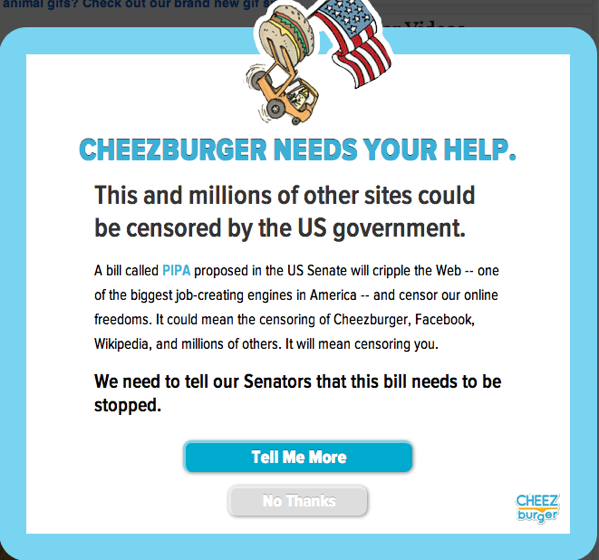The SOPA/PIPA blackout today by Wikipedia, Mozilla, WordPress.com and many other sites is (I hope) drawing attention to proposed legislation that is considered a threat to “Internet freedom.” That’s fine, admirable, and (with any luck) will be effective at curbing SOPA/PIPA for at least another legislative season. The backgrounders I’ve read so far by Wikipedia and others explain pretty well why SOPA/PIPA shouldn’t pass. What they don’t say is that SOPA/PIPA are business as usual, and the protest is a last-ditch effort necessary because the legislative system and mainstream media are fundamentally broken.

The blackout and other protests today are the result of a long, sustained, full-court press against legislation that’s being pushed through despite widespread opposition. Yet, Lamar Smith and many other members of the U.S. House and Senate have been plowing ahead full-steam. Why? Yes, in part because they’re well-funded by the entertainment industry, and it wants the bill passed, but also because they think they can.
The dirty little secret of SOPA is not that the entertainment industry has far more influence than it ought to have on Congress. Anyone who pays attention already knows this. The dirty little secret of SOPA is that almost nobody pays attention to what Congress is doing 99% of the time.
Outside of a few hot-button issues, most U.S. voters are content to complain about government without actually taking any responsibility for following legislation or issues except (maybe) in the run-up to an election.

Most of the SOPA/PIPA tools have to direct people to their representatives because they don’t know who they are or how to contact them. Think about that for a moment. It’s good policy for a political organization to make it as easy as possible for voters to act, of course. But, without instruction, a large swath of the voting public has no idea who to contact or how. Worse, unless you make it as easy as humanly possible, they won’t bother.
Given that environment, it’s little wonder that Lamar Smith thought that he could push SOPA through despite widespread opposition from almost everyone involved in the tech industry.
What I Wish They Said
I’m glad that all of these organizations are taking a stand. But invoking what some call the “nuclear option” is only going to be so effective. Even if SOPA/PIPA are stopped this year, they’ll be back under new names next year. The entertainment industry can afford to keep at it, knowing that the public’s attention span is extremely short. The lobbyists who work on things like SOPA are paid to press these things through Congress. They can focus on them year after year, while the voting public has to make a conscious effort to keep tabs on their representatives.
Informing people about SOPA and asking that they call their representatives is all well and good, but it doesn’t go nearly far enough.
What the SOPA protesters should say is that even if SOPA goes down in flames, it’s not over. It’s never over. Further, the public can not rely on mainstream media to warn them of this sort of legislation. This is doubly true when the legislation is supported by the same organizations that own the media.
Sure, call your representative and senators today. Protest SOPA and PIPA. But beyond that, keep paying attention to what your elected officials are doing. Spend a little more time paying attention to your government, even if it means spending a little less time on entertainment activities.
SOPA could not have gotten this far if the voting public was better informed and more active. It’d be nice to think that Congress will do the right thing by the public even if we don’t keep an eye on it, but we should know better by now.
What I wish Wikipedia (and others) were saying: “Today, we’re going to an extreme to notify the public of bills that threaten the Internet. We’re doing so because this was the only way to get your attention. The mainstream news media was not going to tell you about SOPA or PIPA. Many of your elected officials want to push through harmful legislation because their supporters demand it, and they know you’re unlikely to hold them accountable. It’s vitally important to stop SOPA or PIPA from passing, but what’s even more important is that you start paying attention and demand better from your government. Even if we stop SOPA, the larger problem continues. Tomorrow we’re going to go back to business as usual, but it’s up to you whether Congress does.”





















